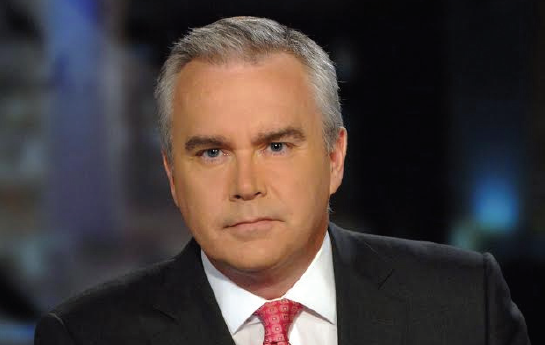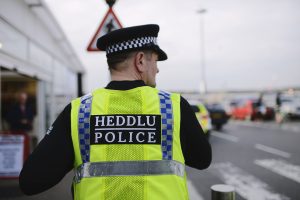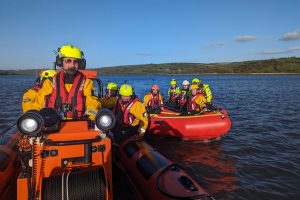
BBC BROADCASTER Huw Edwards kept guests at The National Library of Wales company last Friday (Oct 7) as he shared his adventures that have happened over the last year and explored the future of digital news.
The excitement was very clear in the Drwm at The National Library of Wales, as the audience knew that they were a few minutes away from meeting the Bridgend-born journalist – who had a lot of stories to tell about his years in broadcasting.
The discussion was held in Welsh, and also gave those who were not Welsh speaking a chance to listen to the liv e translator through earphones.
As soon as Huw walked into the room, it immediately felt like a friend had just come to visit you for a few hours. After greeting a few people when he arrived, Huw sat down in front of the audience and was accompanied by a member of staff from The National Library.
After a short and informal introduction by the staff member, Huw stood and warmly addressed the room as he gave a brief summary of his topics for the evening. He also added that he was pleased to be back in The National Library and was delighted to see new and familiar faces.
Giving the audience a bit of a flavour of his life in broadcasting, Huw mentioned that the BBC now has over 2,000 staff members in its London Headquarters, due to all mediums coming together under one roof. This, as Huw points out, makes it even more efficient for journalists to respond and distribute stories that much quicker.
Providing a slideshow of images from his last year, Huw talked about filming the BBC documentary ‘Aberfan: The Fight for Justice’, which will be broadcast on BBC One and S4C this month.
To commemorate the 50th anniversary of the Aberfan disaster on October 21, 1966, when a roaring avalanche of coal waste crashed into a school and nearby houses killing 144 people, BBC Wales will broadcast a series of programmes dedicated to the incident.
In his programme, Huw will trace the story of Aberfan’s decades-long battle for justice and the 76 days of tribunal evidence brought to life by actors through original transcripts.
When discussing this, Huw showed his complete interest in the topic and also added that he spent three weeks in July at Aberfan making the documentary.
Huw then went onto the next slide, which showed evidence of a very busy year for him as he interviewed Barack Obama regarding the EU referendum when he visited the UK earlier this year.
Comically telling the audience that a photo of the interview is enough evidence to say it happened, Huw emphasised the fact that it was an ‘unusual experience for a foreign journalist to interview the President of the United States of America’ and described Obama as a polite man.
The following slide showed Huw’s experience of reporting on the Paris attacks in 2015. The photos of Huw in front of the camera talking to world about the devastating attacks is something that will never be forgotten and is something that all of us will remember when tuning in to BBC One at that time.
The photos showed the importance of Huw’s role and the responsibility he had in delivering the news to the world, which he did so successfully.
Huw then showed another slide, which touched upon his experience in making the documentary ‘Patagonia with Huw Edwards’ on BBC One, televised in 2015. Huw described the unbelievable experience as one of the things he was most proud of in his 30 year career and that the countryside there was ‘beautiful’.
Onto the May elections, Huw then showed several images on the slide of his time broadcasting the topic and said that one of the aims was to try and create a Welsh perspective of the election.
On the nature of knowledge surrounding the subject, Huw talked about the system of the election and that the BBC offered a great service to people when it came to televising the event.
Huw also added that for months, public meetings were held about the Referendum and he also went into detail about the BBC guidelines for journalists and broadcasters.
Huw then went onto briefly talk about his experience in covering the news when Theresa May took up her residency at 10 Downing Street in July earlier this year.
Pointing to the photo on the slideshow of him standing in front of the camera at Downing Street that very day, Huw said that within the space of 14 hours, there was a new Prime Minister as well as a new government.
He further explained that it was a very long day for a journalist and that it was an exciting experience, a day that anyone will always remember.
The audience were then treated to a five minute clip of a 1970s Welsh news programme, which Huw showed to demonstrate what inspired him to branch into journalism, describing the production quality as ‘clean and presentable’.
This then linked to one of the topics that Huw wanted to address to the audience that evening, which was the current position of Wales within the media.
Emphasising that the BBC have a role in producing Welsh news even more so than S4C in recent times, Huw stated that we are in need of a national service when it comes to Wales.
Discussing the timetable alteration for broadcasting, Huw said that this affected the audience greatly- adding that it is important to show your audience that you respect them and that it is important to be loyal to them.
Huw then added that S4C launched a 9pm news slot in recent times and, as a result, the audience numbers have increased greatly.
This then allowed Huw to introduce the topic of the future of digital news. Before going any further, he greatly stressed that despite the fact that the digital era is slowly dominating the ways that people receive news (online and mobile apps), it does not mean that the days of television are over. They are far from over, in fact.
Following this, a slide of statistics was shown regarding audience viewing figures for a variety of channels.
A very interesting slide showed that BBC News at 10pm had 25,000 viewers, ITV News at 10pm had 90,000 viewers, ITV News at 6pm had two million viewers, ITV Wales Today at 6.30pm had 270,000 viewers and S4C News at 9pm had 25,000 viewers.
Seeing the figures written in black and white on a big slideshow really hits home as to how many people tune in to watch the news, as well as showing that television is definitely one of the main mediums people turn to in order to receive news.
Huw mentioned that it is also important to know how competitive news in print are in comparison to online news, such as the Western Mail selling 19,910 in 2015 compared to two million people reading the news on Wales Online.
With 85% of papers being produced in England, Huw stated that the era of receiving news online is growing every day and that 58% of the population depend on the BBC for news.
Huw added that he cannot emphasise enough the continuous growth of the media online, calling it remarkable and to put it into perspective, a total of 15 million people kept up to date with the referendum online.
From this, Huw went onto the next slide that showed more audience statistics but, this time, it showed the various social media sites that people tend to use to share and receive news.
Focussing on Facebook, Huw told the audience that we will no doubt see an even greater presence of the social media platform in years to come, stating that the amount of people using it has increased from 7% to 12% in recent years.
The audience then learned that the BBC Facebook platform has grown from 17% in 2014 to 29% in popularity. During the referendum, the BBC had 45 million people online following the event – a record amount the BBC have had in the space of many years.
Huw then went on to say that, regarding the topics that were popular in 2016, the BBC Breakfast EU Referendum result special programme and the BBC 6pm News slot in January featuring the news of David Bowie’s death were the most watched.
Some of the most popular stories that people read about online throughout 2016 were Alan Rickman’s death and the Paris attacks. Huw also added that the two main topics people mentioned online this year was the EU immigration at 38% and the EU referendum at 40%. Foreign Affairs was the topic least talked about, having a result of 10%.
Huw concluded his presentation by reassuring the audience on Friday evening that the BBC is are still very much present on television and that is the important thing.
The BBC competes with all other broadcasting channels every day of the week and it is the BBC’s duty to provide the Welsh audience with a good service of national broadcasting.
After the discussion, the audience had an opportunity to take part in a Q and A session.
The questions focussed on the role of a journalist during the Referendum, further information on what inspired Huw to have a career within journalism and the advantages to digital media.
Regarding the topic of digital media, Huw said that both the public and journalists have the advantage to receive news rapidly. Accepting that there needs to be more sources and platforms for young people, Huw added that micro news is a healthy thing and that the decision of what is the most reliable source to receive information from is up to the readers.
Addressing the lack and scarcity of sources for the Welsh population, Huw went on to say that in order to expand, people need to take advantage of the online sources that are available.
Huw concluded the evening by telling the audience that what gives him hope is the fact that people have knowledge regarding the ways news can be accessed, be it through online sources or television.
After the discussion, Huw was able to speak to The Herald on how successful he felt the evening was as a whole: “By being here, I just wanted to give to people a sense of what I’ve been doing over the last year because it’s been quite varied. It’s also not often that I get a chance to do an evening in Welsh. I don’t often get that opportunity, so that was enjoyable for me.
“I also wanted to explain a little about where Welsh news is heading, because it’s at quite a challenging place at the moment. I also wanted to say something about audiences, not just in Wales, but across the UK because it’s very competitive now and what we’re seeing with Facebook and other sources of news is that it’s getting incredibly competitive continuously.”
Huw continued by saying: “Newspapers these days have to diversify and produce content online, otherwise there is no future. Tonight was to give people a flavour of how that works.
“I also thought that the questions that were asked were interesting because people are engaged and when we have had such a busy year, with the referendum and elections, for example, people are interested in how the media works. The media plays such an important part in these things.
Huw added: “The talk was very enjoyable, but it wasn’t for me to enjoy but for the people to enjoy. It was a good chance to meet and speak to people in the audience who watch BBC news regularly because they can give us some feedback, and feedback is always good, whatever the view.”
















Add Comment